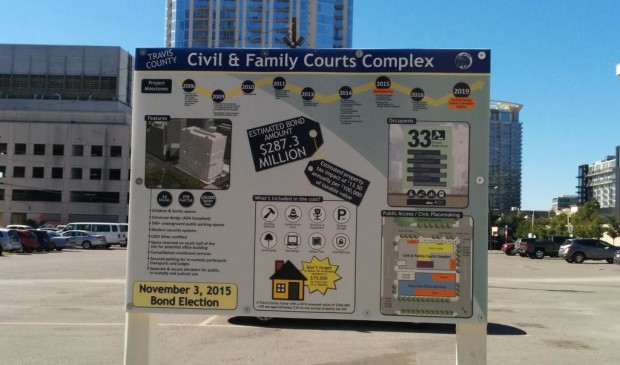Travis County takes brand-new tack in courthouse search
Wednesday, February 21, 2018 by
Caleb Pritchard Travis County’s search for a new site on which to build a new civil courthouse has taken an unprecedented turn after the Commissioners Court on Tuesday voted to solicit proposals from potential private partners interested in both putting up land for the project and building the facility.
The decision adds a new wrinkle to the search that has heretofore focused primarily on simply finding a suitable property.
In 2016, a Community Advisory Committee used an exhaustive set of criteria to pare down potential sites from a list of lands held by both the county and the private sector. Ultimately, the county began negotiations on an unidentified privately held site in Central Austin whose owner offered to build the courthouse.
“It gradually became apparent that we never asked for this type of a transaction through our site selection process so it would only be appropriate to press the ‘reset’ button and go through a competitive process,” senior planner Mark Gilbert explained.
In December, the county issued a formal request for industry comments simply to test the waters and gather basic information from property owners and developers. Gilbert told the court that the effort received 15 responses.
“So if there was that much interest just in giving us input, we think the actual (request for proposal) that has a clear deal for the development community will get even more interest,” he told reporters afterward.
Commissioners voted 4-0 to issue that RFP this Friday. Commissioner Gerald Daugherty was not in attendance at Tuesday’s meeting.
The county will host an industry forum on March 6 to interface with landowners and developers and answer any outstanding questions. The deadline to respond to the RFP is April 9, and the county expects to select a winning bid and negotiate a deal by the summer.
County Judge Sarah Eckhardt said that the prior work conducted by the Community Advisory Committee to locate a new site was not for naught.
“All the criteria that was developed by them is all absolutely in play and is embedded in the requirements of the RFP,” she said, referring to the site-selection matrix the committee developed with staff that measured properties based on characteristics such as size and accessibility.
The county has been working on plans to replace the Heman Marion Sweatt Courthouse, which opened in 1931, for over a decade. The effort hit a major snag in 2015 when voters narrowly rejected a $287 million bond that would have paid for the construction of a new civil and family courts complex at 308 Guadalupe St. Last summer, the county struck a deal with a separate developer to return that property to private use. The 99-year ground lease will be worth an estimated $430 million over the length of its term.
Meanwhile, as the process to find a new site has dragged on, planning staff and the county’s consultant, AECOM, managed to achieve three important victories that will help reduce the project’s final costs, according to Eckhardt.
First, the team refined the space needs and reduced the target size of the new courthouse to 435,000 square feet. That feat was aided by the county’s acquisition of the old U.S. courthouse building on West Eighth Street that will ultimately accommodate four probate courts that would have otherwise ended up in the new facility. Eckhardt reminded reporters that the county was able to secure the 82-year-old building from the federal government for free.
“Thanks, Obama,” Commissioner Brigid Shea quipped. Eckhardt seconded that notion before crediting U.S. Rep. Lloyd Doggett as well.
The third and final cost-saving measure unearthed during the process of locating a new courthouse site was what Eckhardt called the “build-to-suit delivery option” that the county is now pursuing with the new RFP.
Gilbert elaborated, “The standard process of buying land and then going through the process of selecting a designer and a construction team is very slow, and it takes a lot of time, and time is a lot of the additional cost for this project. And ultimately, the taxpayer bears this cost.”
The Austin Monitor’s work is made possible by donations from the community. Though our reporting covers donors from time to time, we are careful to keep business and editorial efforts separate while maintaining transparency. A complete list of donors is available here, and our code of ethics is explained here.
You're a community leader
And we’re honored you look to us for serious, in-depth news. You know a strong community needs local and dedicated watchdog reporting. We’re here for you and that won’t change. Now will you take the powerful next step and support our nonprofit news organization?









